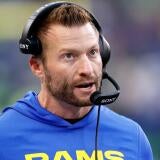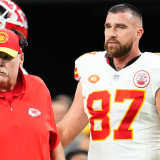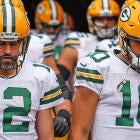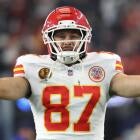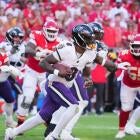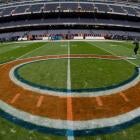Ranking the NFL's all-time best QB lines of succession: Packers, Cowboys, 49ers in a league of their own
Jordan Love is extending the Packers' rich quarterback tradition

Lines of succession are generally reserved for Kings and Queens. Take the British throne for example. King Charles currently reigns with his son Prince William next in line, followed by his three children, followed by Prince Harry and his two kids. The line of succession to the quarterback throne in Green Bay has also been filled with royalty and its fair share of drama.
The Packers drafted Aaron Rodgers 24th overall in 2005 after he could have been the top pick and had one of the most memorable slides down the draft board. He sat behind Brett Favre for three years before becoming an all-time great in his own right. There was well-documented friction between Favre and Rodgers in that time, and Favre and the Packers organization as he retired and unretired following an NFC Championship loss in the 2007 season.
We also know all about the drama between Rodgers and Green Bay after general manager Brian Gutekunst traded up for Jordan Love in the first round of the 2020 NFL Draft. In a nearly identical scenario, Love sat behind Rodgers for three years before ascending to the throne.
Ignoring all of the drama, you can't deny this line of succession has been a picture of perfect quarterback development as it's already churned out two all-time great quarterbacks with another already considered a franchise quarterback. The symmetry is what makes it so beautiful. Both Rodgers and Love were drafted in the first round and sat behind an all-time great quarterback (who was near the end of his career) for three years, only to blossom themselves.
The numbers from this three-decade stretch are stunning, too.
- The Packers went 31 straight seasons with a former or future NFL MVP quarterback on their roster from 1992 to 2022, the longest streak of any team in NFL history. Who knows, maybe Love will eventually extend that run, too.
- The trio of Favre, Rodgers and Love have combined for 24 playoff wins, 19 Pro Bowl selections, 17 seasons with 30 touchdown passes, seven MVPs and two Super Bowl rings.
- The Packers have over 100 more touchdown passes than any team since Favre arrived in 1992.
- All three became the highest-paid quarterback of all time at some point with Green Bay, including Love, who just matched Joe Burrow and Trevor Lawrence in that regard.
The Packers undoubtedly have had the best quarterback play in the NFL since the 1990s, but is it the best quarterback line of succession ever?
To answer this question I looked at quarterback play since the 1970 NFL-AFL merger, specifically using a stat from Pro Football reference called ANY/A+. That's short for "adjusted net yards per attempt index" and is regarded as a better version of passer rating that is era adjusted (100 is average).
I used this stat to identify some of the best runs that mirrored the Packers. Meaning decades long spans with three quarterbacks that were franchise guys, or close to it.
I've ranked them in the chart below with length of their run, their average ANY/A+, the low season, high season, along with their combined accolades in that time.
Best Quarterback lines of succession
| YRS | AVG | LOW | HIGH | P-WINS | TITLES | PB | MVPs | ||
|---|---|---|---|---|---|---|---|---|---|
1. 1992-2023 Packers | Favre, Rodgers, Love | 32 | 113 | 88 | 147 | 24 | 2 | 19 | 7 |
2. 1980-2003 49ers | Montana, Young, Garcia | 24 | 122 | 105 | 141 | 23 | 5 | 17 | 4 |
3. 1971-2000 Cowboys | Staubach, White, Aikman | 30 | 109 | 72 | 139 | 29 | 5 | 13 | 0 |
4. 1997-2021 Falcons | Chandler, Vick, Ryan | 25 | 105 | 90 | 141 | 8 | 0 | 9 | 1 |
5. 2004-2023 Bengals | Palmer, Dalton, Burrow | 20 | 101 | 86 | 130 | 5 | 0 | 6 | 0 |
6. 2002-23 Chargers | Brees, Rivers, Herbert | 22 | 110 | 81 | 131 | 5 | 0 | 10 | 0 |
7. 1965-91 Jets | Namath, Todd, O'Brien | 27 | 103 | 72 | 126 | 5 | 1 | 7 | 0 |
Here's why I ranked them where I did.
1. Brett Favre, Aaron Rodgers, Jordan Love (Packers)
The Packers trio is the best because it's the longest stretch of great individual quarterback play and postseason results. Plus, it was a perfectly executed succession plan and Love has a chance to make this a four-decade run, which is mind-boggling.
2. Joe Montana, Steve Young, Jeff Garcia (49ers)
The 49ers trio from Joe Montana to Steve Young and Jeff Garcia is a close, close second. The Buccaneers traded Young to the 49ers after drafting Vinny Testaverde first overall in 1987. He backed up Montana for several years before winning two MVPs and a Super Bowl MVP. Jeff Garcia, a former Grey Cup MVP, made three straight Pro Bowl selections when Young was forced to retire following a nasty concussion. Garcia also led San Francisco to a stunning comeback in the playoffs vs. the Giants. Incredibly, San Francisco went 25 straight seasons where a primary starter had an ANY/A+ of 100+, easily the longest streak by any team -- 25 straight seasons of at least average quarterback play is absurd. This stretch is definitely more dominant than the Packers in terms of Super Bowls (five to two), but it's not nearly as long (32 years vs. 24 years) as Garcia lasted only five years in San Francisco. Also, the optics around this line of succession were definitely not as intentional as how the Packers drafted each replacement in the first round.
3. Roger Staubach, Danny White, Troy Aikman (Cowboys)
Next up, the Dallas Cowboys, who enjoyed three straight decades with Roger Staubach, Danny White and Troy Aikman. White did not make a Super Bowl or get a gold jacket like the other two, but Dallas still enjoyed 29 playoff wins and five Super Bowl titles between the three. This trio mirrored the Packers pretty closely but I'll give Green Bay the edge with seven MVPs to Dallas' zero.
4. Chris Chandler, Michael Vick, Matt Ryan (Falcons)
I was surprised to run into the Falcons here, but upon further digging, I can see it. Chris Chandler was a journeyman before becoming the Falcons starter for five seasons, making two Pro Bowls and leading them to a Super Bowl trip in 1998. He eventually gave way to Michael Vick, one of the most iconic quarterbacks ever. Matt Ryan was a Pro Bowl-level quarterback for 15 years who won an MVP and reached a Super Bowl.
5. Carson Palmer, Andy Dalton, Joe Burrow (Bengals)
This is the JV squad of the Packers run. Three straight homegrown, high-drafted signal-callers. All three led Cincinnati to the playoffs, and all were MVP front-runners at one point (yes, even Andy Dalton in 2015). The problem is, Joe Burrow was the only one to win a playoff game, and overall the trio delivered just above average play for two decades (ANY/A+ of 101).
6. Drew Brees, Philip Rivers, Justin Herbert (Chargers)
I could have ranked this trio as high as fourth, but the Chargers essentially pulled the plug on Brees entering his third season by acquiring Philip Rivers in 2004, the fourth overall pick. Who knew Brees would go on to have one of the greatest careers in NFL history.
7. Joe Namath, Richard Todd, Ken O'Brien (Jets)
The Jets executed a clean succession plan from Joe Namath to Richard Todd and Ken O'Brien for nearly three decades. Namath won a Super Bowl and had a Hall of Fame career while Todd and O'Brien were each relatively average for a decade. Imagine if the Jets had drafted Dan Marino over O'Brien!
These two-quarterback runs were pretty good, too:
Honorable mentions: two-man successions
- Ken Anderson, Boomer Esiason (Bengals): two-decade run where each reached Super Bowl and won an NFL MVP award
- Drew Bledsoe, Tom Brady (Patriots): nearly three-decade run began with Bledsoe leading Patriots to a Super Bowl and becoming highest-paid quarterback in NFL before Brady became the GOAT
- Peyton Manning, Andrew Luck (Colts): two-decade run but Luck never reached potential due to injuries and early retirement
- Warren Moon, Steve McNair (Oilers/Titans): two-decade run with a Hall of Fame career (Moon) and MVP/Super Bowl season (McNair)
- Tony Romo, Dak Prescott (Cowboys): 17-year run with impressive numbers but no conference title game
When it's all said and done, it's possible that none of these will even be able to hold a candle to the Packers run. Consider what Love did last year. His 37 touchdown passes last year were third-most all time in a quarterback's first season as a full-time starter (including playoffs), behind Patrick Mahomes and Kurt Warner. He led a team that was the youngest to win a playoff game since the merger. It's setting up for a four-decade reign of quarterback royalty in Green Bay.



